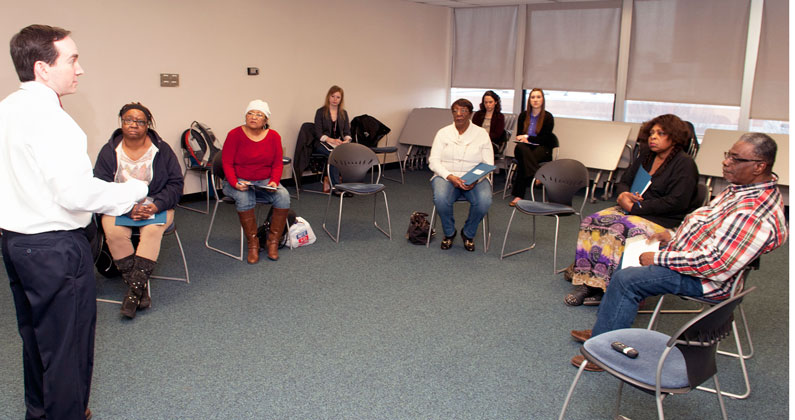Working to Increase Happiness
September 18, 2017 A new program at PCOM aims to help community members increase positivity in their
lives.
A new program at PCOM aims to help community members increase positivity in their
lives.
A recent study in the journal Applied Psychology: Health and Well-Being appeared to confirm what researchers have thought for many years: that happiness
has a strong impact on healthy behaviors. A new program launched by Scott Glassman, Psy D ’13, associate director of the Master of Science in Mental Health Counseling program, speaks directly to that correlation.
The program, called “A Happier You,” is designed to help participants enhance their optimism, increase the frequency
of positive emotions, and better manage any negative emotions. Over the course of
six weeks, occurring several times throughout the year, a group meets at one of PCOM’s three community-based Healthcare Centers for an open discussion that focuses on instances in each participant’s life which
could positively affect his or her mood and activities to increase happiness in a
variety of areas. Weekly themes include gratitude, kindness, humor, successes and
personal strengths.
“This is not therapy,” Dr. Glassman said. “We don’t delve deeply into personal obstacles,
problems and past challenges but rather, we focus on how to grow and maintain positivity
in the here and now.”
At a recent “Happier You” session on City Avenue, one group member, David, shared
how some chronic health issues had caused him to be “mean. I was depressed,” he said.
“I couldn’t accept my limitations, and I was fighting with the doctors. I didn’t listen.”
He also noted he had felt burned out from his job as a nurse. He was referred to the
group, and became a fixture in the program’s first two six-week sessions.
“It helped my attitude, I don’t let things get to me anymore,” said David. “I’ve come
to accept certain things, and I listen more.”
Dr. Glassman says the program hopes to help its participants flex their happiness
muscles. “Happiness is a skill that becomes more automatic with time,” he says. “And
one person sharing their positive experiences can help and inspire others in the group.”
Each week in the program focuses on a different area and offers tips on how to not
only cope with negative emotions, but also increase positive ones. At the end of each
session, participants are given “happywork”—activities that can be done between sessions
to help continue to grow feelings of happiness and positivity. Participants are asked
to rate the strength of their positive feelings before and after activities to become
more aware of the control they have over mood.
“We’re giving them the tools to build on the best of who they already are,” said Dr.
Glassman.
Visit PCOM's A Happier You webpage for more information.
You May Also Like:
About Philadelphia College of Osteopathic Medicine
Established in 1899, Philadelphia College of Osteopathic Medicine (PCOM) has trained
thousands of highly competent, caring physicians, health practitioners and behavioral
scientists who practice a “whole person” approach to care—treating people, not just
symptoms. PCOM, a private, not-for-profit accredited institution of higher education,
operates three campuses (PCOM, PCOM Georgia and PCOM South Georgia) and offers doctoral degrees in clinical psychology, educational psychology, osteopathic
medicine, pharmacy, physical therapy, and school psychology. The college also offers
graduate degrees in applied behavior analysis, applied positive psychology, biomedical
sciences, forensic medicine, medical laboratory science, mental health counseling,
physician assistant studies, and school psychology. PCOM students learn the importance
of health promotion, research, education and service to the community. Through its
community-based Healthcare Centers, PCOM provides care to medically underserved populations.
For more information, visit pcom.edu or call 215-871-6100.
Contact Us
For general media inquiries, please contact the Office of Marketing and Communications
at 215-871-6300 or communications@pcom.edu. Visit our media relations page to view contact information for public relations personnel.
Connect with PCOM
 A new program at PCOM aims to help community members increase positivity in their
lives.
A new program at PCOM aims to help community members increase positivity in their
lives.